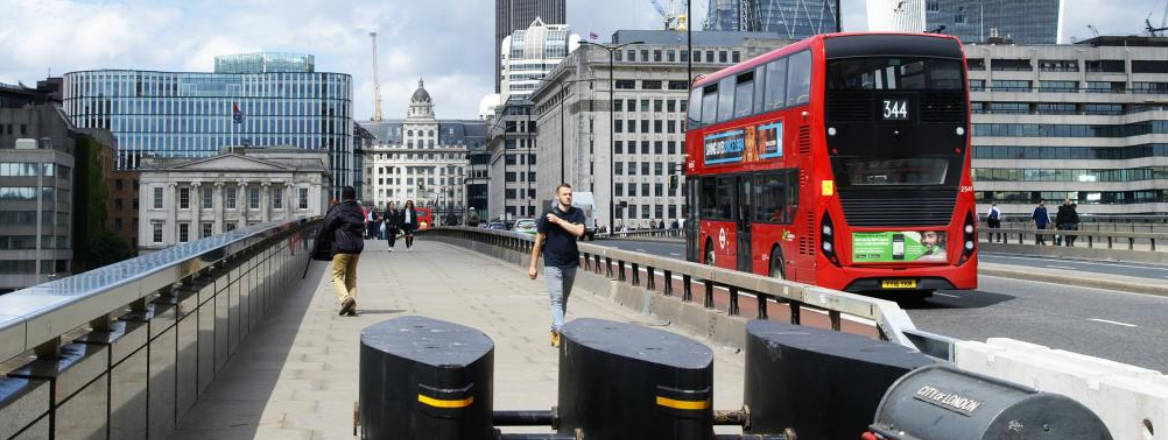MI5 Chief: Daesh Is Dead in Syria and Iraq – But Threat Here is Growing Rapidly
Andrew Parker has issued a stark warning about the terror threat facing the UK. And it is only going to get worse with the collapse of Daesh.
MI5 boss Andrew Parker yesterday gave the UK a stark reality check. In an unprecedented televised speech, he warned that the demise of Daesh (also known as the Islamic State of Iraq and Syria, or ISIS) will not reduce the terror threat to the UK.
On the contrary, Parker said the threat was evolving at the ‘highest tempo’ he had known in his 34-year career. And, worst of all, we have not reached the threat’s highest watershed.
Parker’s speech coincided with news that Daesh’s three-year hold on its self-proclaimed capital of Raqqa in Syria has crumbled.
However, it is highly likely that Daesh will morph into something equally sinister. And it is certainly true that Daesh is urging its fighters to regroup in places such as Libya, where it is already recruiting vulnerable young would-be migrants trying to flee to Europe.
Daesh also maintains the will and the capability to exert influence elsewhere in other countries that lack the rule of law or strong government.
The home-grown terrorist was the greater threat to the UK rather than the extremists who had travelled abroad
Parker suggested – perhaps surprisingly and counter-intuitively – that the main threat in the UK is not as previously feared that from returning Daesh fighters, although they are a concern. He said their number has slowed to a trickle and the 400 or so who have returned remain a small section of the 3,000 ‘people of concern’ with extremist views in the UK.
Instead, Parker said it was the home-grown extremist who had not travelled abroad and who was now the greater threat.
This bigger threat, said Parker, was more diverse and harder to detect. Attacks will happen more quickly, and the range of terrorists’ tactics makes them far more complex than in the past.
These tactics include from those planned over time in the Middle East, such as the 2015 Paris attacks, to quickly put together attacks as experienced by London this year. Furthermore, Daesh’s modus operandi is no longer predictable, and their weapons range from bombs to guns, to a knife or a vehicle.
Parker spoke as MI5 faces pressure for failing to prevent the four attacks this year by Islamist extremists, most of whom were previously known to UK authorities.
These happened despite the fact that, as he pointed out, MI5 has played a crucial role in foiling a further seven attacks in the past seven months and 20 in the past four years. In other words, far more attacks are thwarted than getting through.
Parker defended his staff and was frank about the work they are doing in the face of such pressure. He revealed that, in conjunction with the police, MI5 is conducting a detailed review of recent terrorist attacks in what he described as ‘the harsh light of hindsight’, using that to squeeze out as much information and operative lessons as possible, in the drive to stay ahead of the threat.
This is crucial work, an exercise in learning from the past, a psychological trawl through what is already known and what has been missed. And high on the agenda will be modern technologies that are not only exploited by the terrorists, but could also be used by those tracking them.
As Brexit looms, Parker resolutely maintained impartiality, so he ducked questions about the practical challenges to his service this would cause. Still, he praised the ever-deeper partnerships within the wider pan-Europe alliance of more than 30 intelligence agencies known as the Counter Terrorism Group (CTG), whose operations centre is in the Netherlands.
MI5 agents who often work in close proximity with the terrorists, searching for intelligence, are the ‘pinpricks of light against a dark and shifting canvass’
CTG, he revealed, runs joint operations on a daily basis and at least twelve terrorists are in custody due to its work. This work, he stressed, would not be compromised by Brexit, though he did not venture into the greyer areas of data protection and sharing, which could in theory have implications for joint working and exchange of information, post-2019.
Instead, Parker said MI5, and its partners in the UK, Europe and the US are ‘developing, growing and sharpening our capabilities all the time’.
Parker was measured and largely unemotional, except where he chose to praise the work of his staff, and when he paid tribute to the 36 people who had been killed in the UK through terrorist attacks this year.
He also made a rare nod to the dangerous, covert work of agents who often work in close proximity with the terrorists, searching for intelligence; they are the ‘pinpricks of light against a dark and shifting canvass’, as he put it, and their work can be enough to thwart a plot.
MI5 is currently dealing with 500 live terrorist investigations. It still has other risks to face — that from terrorism in Northern Ireland, for example, to countering espionage from states such as Russia.
The Service is expanding its staff numbers from 4,000 to 5,000, and each one of them will be needed. For Parker’s speech was a salutary reminder that in the modern age, success against the terrorists in one place does not remove the threat to UK security.
It remains acute, and will be for years to come.
The views expressed in this Commentary are the author’s, and do not reflect those of RUSI or any other institution.

